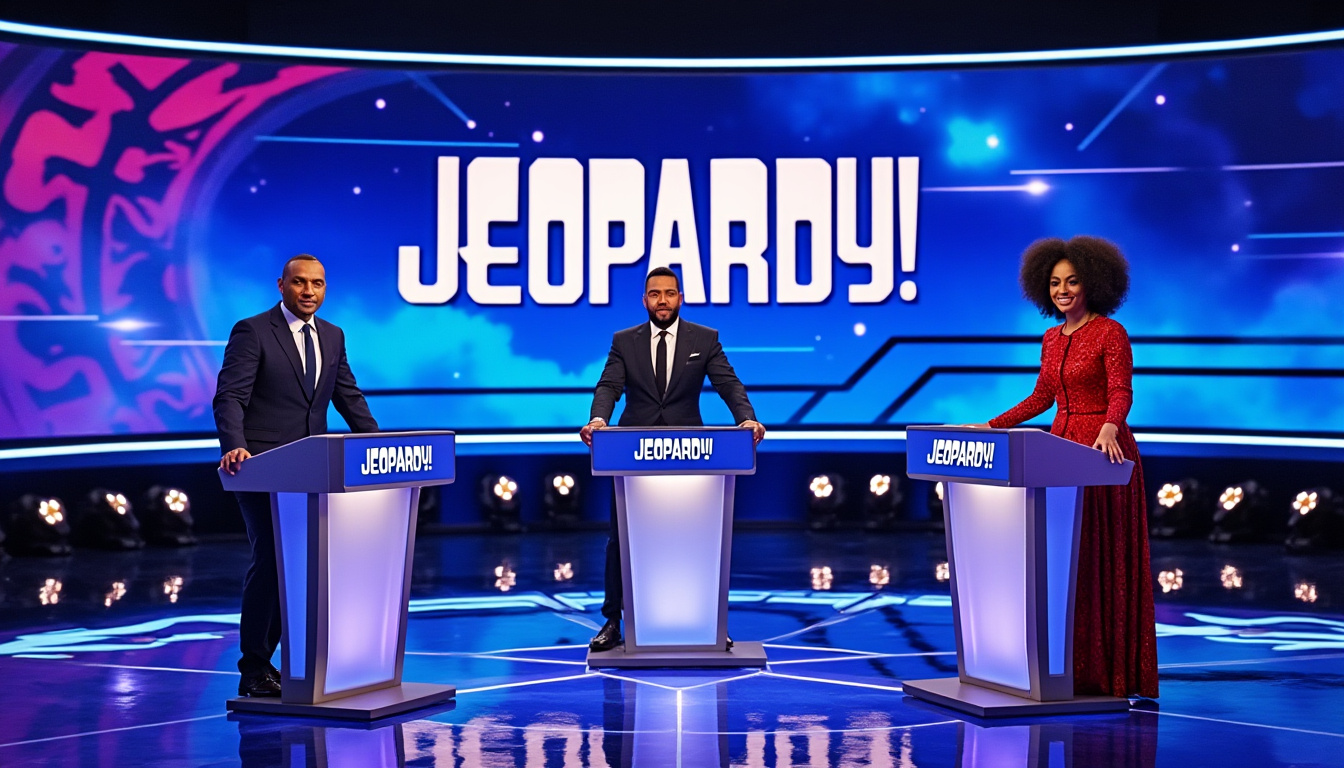Overview of Final Jeopardy on March 17, 2025
The world of trivia and quiz shows finds its zenith during the Final Jeopardy segment, where contestants face a single, decisive question that can change the trajectory of their journey on the show. The episode on March 17, 2025, delivered intense competition among three talented contenders: Alex DeFrank, Clare Murray, and Brett Aresco. Each vying for not only the title of champion but also a generous cash prize.
This particular episode captivated viewers, as the stakes were high and the atmosphere electric, culminating in a nail-biting conclusion that showcased the power of knowledge and strategic wagering. Not only does this event symbolize a celebration of intellect, but it also underscores the reason why Jeopardy remains one of the most revered television quiz shows.
Contestant Profiles
Alex DeFrank: The Resilient Champion
In the world of competitive quiz shows, personalities can greatly affect performance. Alex DeFrank proved to be a spirited contestant with his impressive knowledge base, earning a rightful place in the spotlight. Having entered this match with an already formidable total of $42,401 from previous performances, Alex capitalized on his moment in the sun. The pressure was on as he faced off against his fellow contestants, especially after a shaky moment in the second round where he experienced an incorrect Daily Double bet.
Despite this setback, Alex displayed remarkable grit. With sheer willpower and a meticulous approach to the game, he managed to transform his fortunes. His triumph not only won him acclaim but also demonstrated that in Jeopardy, the power of recovery can often lead to astonishing outcomes. Alex DeFrank became a pivotal figure in the episode, a player who embodied determination and strategic savvy.
Clare Murray: The Tenacious Student
Representing Ontario, Canada, Clare Murray brought youth and enthusiasm to the Jeopardy stage. As a student, Clare represented a fresh perspective in a format traditionally dominated by more seasoned contestants. Her journey in this episode was marked by ambition and the spirit of learning. Clare began with a strong focus, but the pressure of the Final Jeopardy could be overwhelming, especially against a formidable opponent like Alex.
After securing a meager total of $2,800, Clare wagered everything on her Final Jeopardy answer. Such boldness spoke volumes about her character, showcasing the unyielding spirit of a young contestant willing to take risks in pursuit of victory. Unfortunately, her guess of “Quirkle” led to a devastating loss, yet the experience earned her admiration from viewers. Clare’s journey through the episode serves to inspire others, particularly younger audiences, about the merits of tenacity and the excitement of knowledge acquisition.
Brett Aresco: The Strategic Thinker
Brett Aresco presented himself as a well-rounded contestant hailing from Alabama, possessing both knowledge and an analytical mindset required for Jeopardy. His starting total of $9,800 placed him in a commendable spot, yet the pressure of competitive trivia is unlike any other. Throughout the episode, Brett maintained a calm demeanor, indicating a sound strategy worthy of examination.
As Brett faced his opponents, he made calculated decisions, which unfortunately slipped away when it mattered most. With a guess of “Tetris” during the Final Jeopardy, Brett experienced a significant setback that reduced his cash earnings dramatically. Still, he finished as the second place contestant, leaving a total of $1,800, but it was evident that Brett’s strategic approaches would serve him well in future competitions.
Understanding Final Jeopardy Clue and Answer
The Anatomy of a Final Jeopardy Question
The Final Jeopardy round stands as a high point of tension and anticipation in the show. Contestants wager their earnings based on their confidence in answering a single clue from a specific category. For March 17, 2025, the category was “Toys & Games,” which immediately promoted an engaging discussion among the audience and contestants alike. The clue posed was intricate, leading players through a series of contemplative deductions.
The clue stated: “Preparing for a course on descriptive geometry & researching the 5 Platonic solids led a professor to invent this.” for every trivia aficionado, a question containing such references provides a multifaceted approach to determining the answer, often leading to a deep dive into mathematical concepts and gaming history. Contestants needed to familiarize themselves with both the clue and the connection to popular culture.
Solution Revelation and Discussion
The correct answer revealed at the end of the episode was “What is the Rubik’s Cube?” A testament to the inventor Erno Rubik’s innovation, the Rubik’s Cube encapsulates both a timeless puzzle and a significant aspect of geometry through its Platonic solids connections. This answer not only showcased the contestants’ knowledge but also engaged viewers in a larger conversation regarding education and entertainment.
The Rubik’s Cube, known previously as the Magic Cube, continues to inspire both casual players and competitive solvers worldwide. This interplay between playfulness and intelligence perfectly captures what Jeopardy embodies — the merging of fun and learning through concise, thought-provoking challenges.
Final Jeopardy Earnings and Results
A Breakdown of Earnings for Each Contestant
The earning dynamics during Jeopardy make for fascinating insights, particularly in Final Jeopardy, where one question can alter characters’ fates dramatically. The outcomes of the current round packed plenty of surprises; let’s delve deeply into the contestants’ final earnings and wagers. These crucial numbers underscore not only the intellect displayed but also the strategic choices made:
| Contestant | Starting Total | Final Wager | Final Total |
|---|---|---|---|
| Alex DeFrank | $42,401 | $5,200 | $56,401 |
| Brett Aresco | $9,800 | -$8,000 | $1,800 |
| Clare Murray | $2,800 | $2,800 | $0 |
From the table, it is evident that Alex, despite early setbacks, turned the tides in his favor through a brilliant answer that not only secured his victory but also elevated him beyond the $56,000 mark in earnings. Brett’s loss of $8,000 after a risky guess led him to second place, while Clare’s choice to wager all her earnings resulted in an unfortunate exit from the game without a prize. This encapsulates the thrilling unpredictability that is the hallmark of Jeopardy, delivering both incredible highs and heartbreaking lows for its participants.
The Dynamics of Wagering Strategies in Jeopardy
Understanding Contestant Strategies
The art of wagering during Final Jeopardy draws parallels to tactics seen in high-stakes gambling. Contestants must assess not only their knowledge but also their opponents’ capabilities and their current scores when deciding how much to risk. Alex’s successful wager exemplified both awareness and confidence, taking advantage of the possibilities laid before him.
In contrast, Clare’s all-in approach, though bold, left her vulnerable and ultimately led to disappointment. Brett’s choice reflects a more conservative but potentially less rewarding tactic, illustrating a range of strategies that competitors embrace in their quest for triumph. This diverse array of approaches emphasizes the nature of Jeopardy’s gameplay, creating a thrilling environment where intellect and risk management intersect.
How Trivia Knowledge Shapes the Game
Ultimately, the knowledge held by contestants forms the foundation of their success on Jeopardy. From history to pop culture, the breadth of topics demands extensive preparation and intuitive recall. The question given on March 17 emphasized the interplay between learning and application, illustrating how prior experience can come to fruition in intense moments of competition. Contestants who embrace adaptability in their learning processes tend to excel in this high-octane quiz format.
This dynamic directly reflects broader themes in education and personal growth, showcasing how diverse areas of knowledge can be synthesized into actionable insights during moments of pressure. Each contestant’s journey presents an opportunity for exploration and discovery, making Jeopardy not just a game show but a platform for lifelong learning and curiosity.
Community and Audience Engagement
The Role of Viewers in Jeopardy’s Success
The captivating nature of Jeopardy extends beyond the contestants; it engages millions of viewers worldwide, creating a shared experience that transcends mere entertainment. Fans tune in, not only to witness intellectual battles but also to learn alongside their favorites. The conversations sparked by the show often flow into social media, where trivia enthusiasts share insights, views, and predictions regarding contenders and strategies.
This community aspect is vital for the longevity of Jeopardy. It fosters a sense of camaraderie among trivia enthusiasts who hail from diverse backgrounds but share a common passion. Through inclusive online platforms like Jeopardy Tonight and fan blogs like The Jeopardy Fan, discourse thrives, bringing audiences deeper into the world of knowledge and competition.
How Platforms Amplify Trivia Culture
In the age of social media, platforms serve as catalysts for increased visibility and appreciation for trivia culture. Fans utilize Twitter, Facebook, and Instagram to share insights, predictions, and favorite moments from episodes. The engagement provided by platforms enhances the show experience exponentially, blending it into the larger fabric of pop culture.
The excitement of participating in conversations surrounding Jeopardy boosts viewership and cultivates loyalty. New products, challenges, and thematic explorations resonate with audiences, ensuring that the game retains its relevance among contemporary trends. Such engagements not only reflect the changing nature of entertainment but also where quiz shows can find their place within that dynamic landscape.

The Broader Impact of Quiz Shows on Education
Quiz Shows as Educational Tools
Jeopardy exemplifies the capacity of quiz shows to function as informal educational tools, bringing knowledge to the forefront of viewers’ minds. Through its diverse array of topics, it encourages learning and curiosity within many homes. While entertaining, the format fosters a culture of questioning and inquiry that enriches viewers outside of the game.
In an era where educational technologies and methodologies continuously evolve, Jeopardy stands as a unique bridge connecting entertainment and fundamental learning. Participants often reflect on what they have absorbed from previous episodes, while audiences cultivate an environment where continuous learning flourishes. With hosts encouraging participation from viewers, the show creates an interactive atmosphere that compels audiences to root for their favorite contestants.
The Role of Nostalgia in Jeopardy’s Popularity
The enduring appeal of Jeopardy can also be traced back to nostalgia. Generations of viewers have grown up with the show, fondly recalling the anticipation that accompanied each new episode. Promotions through various media continuously weave the show into the pop culture narrative, drawing in new fans while nurturing admiration among longtime supporters. The cultural relevance must not be underestimated; Jeopardy tied into family traditions and shared moments, which invest deeper emotional connections.
As the game evolves, staying attuned to changes in society and cultural expectations proves crucial. With efforts to celebrate diversity and innovation in questioning, Jeopardy can continue highlighting the importance of knowledge in today’s rapidly evolving world.


